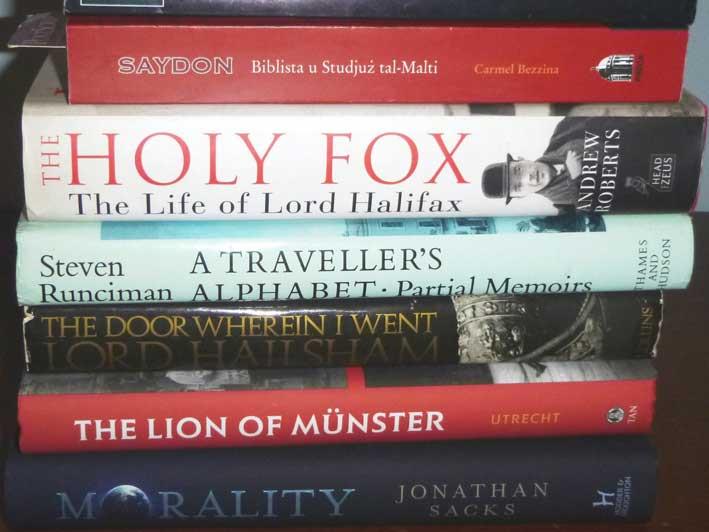January and February 2020 were hectic months. They seemed to be one interminable cycle of meetings, engagements, deadlines, committees, conferences, dinners, lectures and public talks - and then some. In other words, an introvert's nightmare. There is nothing quite as taxing as having to be pleasant and engaging when a good book and a cup of builder's brew beckon at home, particularly during the winter months.
During these busy periods, there is the temptation to ask oneself what life would be like if everything, overnight, had to be put on hold. The old cliché to 'be careful what you wish for' never rang truer. Overnight, everything scheduled was cancelled or postponed as daily life shifted 'online' or 'remotely'. Every utopia, eventually, turns into a dystopia.
I am a self-confessed Luddite. Nonetheless, In a matter of days, my study-room started to function as a make-shift office, lecture room and - on one or two occasions - a radio and a television studio. Our way of doing things shifted radically, overnight. However, it also forced us to re-think whether our old way was the most efficient. Our natural environment certainly didn't seem to think so! It was nice to breathe cleaner air, albeit for a short time.
At the beginning of summer, I was invited by Sergio Grech on his Campus FM programme "X'se Naqraw das-Sajf?" It is always a pleasure to be interviewed by Sergio - he is a prolific writer and a voracious reader - and his love of the written word infuses everything he does. As I was preparing for this programme, I realised what a huge debt of gratitude I owe to my teachers who inculcated in me a love for reading and writing and helped decipher which genres I enjoy most.

Some books I read during the pandemic stand out from the rest. Tom Holland's "Dominion" traces the origins of Western thought to Christianity. Peter Seewald's "Wisdom from the Monastery" was particularly apt since we were all, effectively, cloistered. Jonathan Sacks' "Morality" was a much-needed rallying cry for the common good. Benedict XVI's "Faith and Politics" was an eye-opener. Christopher Hitchens' "Unacknowledged Legislators" is yet another beautiful collection of his essays. His memoir, "Hitch-22" was equally riveting. Tom Gallagher's biography of Portuguese dictator António Salazar explores the life of this under-researched autocrat. Victor Aquilina's biography of Lord Strickland presents us with an excellent portrait of one of Malta's most fascinating political figures.
I am now looking forward to reading Professor Henry Frendo's latest opus "Diaspora: Maltese Overseas Settlement," Malcolm Muggeridge's autobiography "Chronicles of Wasted Time" and Julian Jackson's biography of General Charles De Gaulle (beautifully titled "A Certain Idea of France").
There is much consolation in poetry too. I've enjoyed dipping into some old-time favourites; C.P. Cavafy, Rudyard Kipling and T.S. Eliot. The latter's paraphrasing of the great Julian of Norwich seemed prescient: "And all shall be well and all manner of thing shall be well." So we hope.
The way one conducts research had to be thought anew. With travel restrictions, plans for study visits to conferences, libraries and archives had to be shelved, thus forgoing the opportunity of re-visiting Amsterdam, Edinburgh, Innsbruck and Oxford. I was incredibly disappointed about the cancellation of the Oxford trip. Oxford remains one of the most extraordinary cities in the world. I am always star-struck by its architecture, its traditions, its pageantry and its Colleges. The world would be a poorer place without this great centre of learning. Slipping into one of the University Church's stalls, or Oriel College's Chapel - John Henry Newman's old stamping ground - is both restorative and inspiring.
Despite these setbacks, I was glad to finish and publish some academic papers and studies - on the political-religious context of the Sette Giugno, on the writings of Maltese Prime Minister Dom Mintoff, on the 1989 Bush-Gorbachev Summit, and the political context of the Oxford Movement. Together with a colleague of mine, Dr Jean Claude Cachia, I also got to work on a paper on the discourse of the President of the European Commission during the pandemic. The joys of technology allowed us to present this work at the 14th General Conference of the European Consortium for Political Research and guest-lecture at the Free University of Brussels.
The Christmas break was coming to a close when I was asked to write this diary. Sure enough, Christmas 2020 was different from all the other festive seasons I've known so far. There were no social gatherings - at least for those of us who adhere to the very valid advice of the health authorities. Yet, there was something incredibly moving about the scaled-down festivities. It was one of the first Christmases in a while which I enjoyed.
I read up on the progress of the vaccine and its roll-out with great interest and anticipation. I know many close family members and friends have been negatively affected by this pandemic. It is causing a great deal of anxiety, and it has discombobulated their lives in unimaginable ways. It will be a good day when their worries ease - and when the thought of a cheeky pint or an impromptu outing wouldn't be the cause of much anxiety.